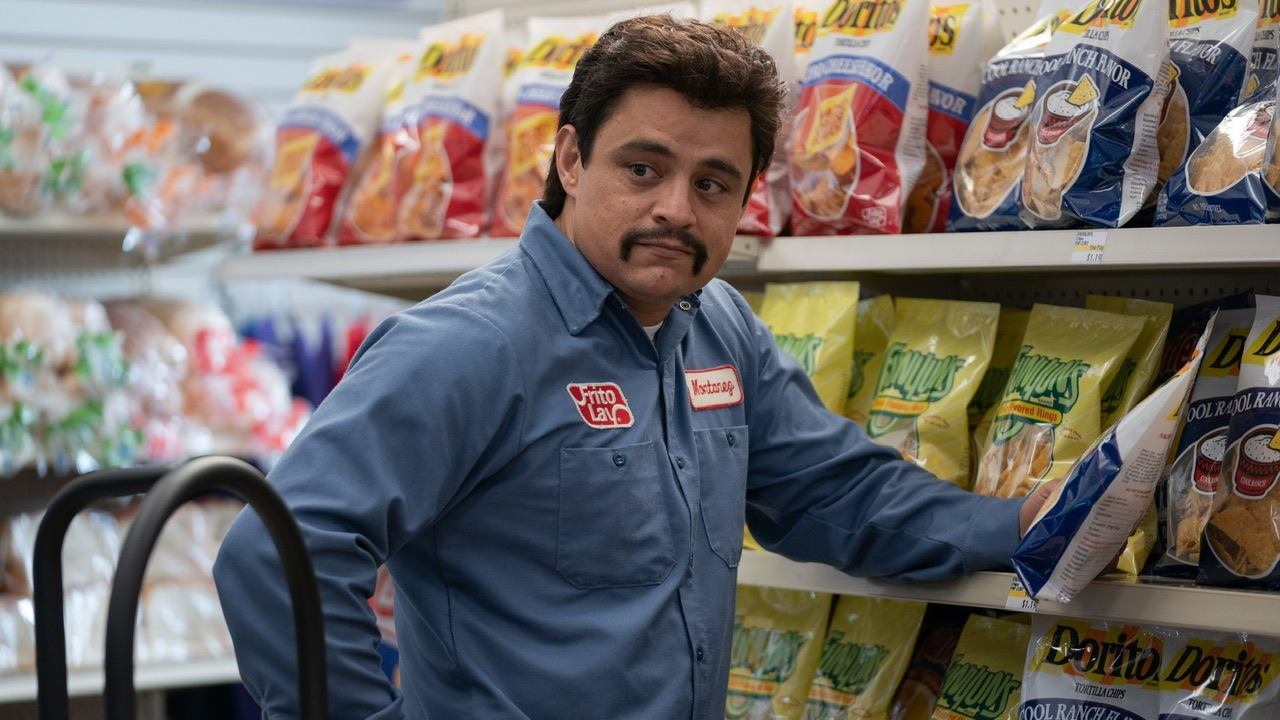'Flamin’ Hot' Review: A Spicy Cheetos Origin Story
- Details
- Category: New Series and Movie Reviews
- Published: Monday, 12 June 2023 15:31
- Written by Lupe R Haas

FLAMIN’ HOT is the movie the Frito-Lay company doesn’t want you to see. Directed by Eva Longoria, the Hulu and Disney+ movie is an origin story of the Flamin Hot Cheetos, allegedly the brain child of former Frito-Lay executive Richard Montañez during his early days as a janitor at the company. Despite the corporation’s claim that Montañez had nothing to do with the launch, FLAMIN’ HOT is an inspirational rags-to-riches Latino story.
Jesse Garcia plays Montañez with Annie Gonzales (Gentefied) as his wife Judy with Dennis Haysbert and Tony Shaloub in supporting roles.
Based on Montañez’s memoir, "A Boy, a Burrito, and a Cookie: From Janitor to Executive," the 18-year-old husband and father of one started working at Frito-Lay/PepsiCo after a short prison stint for his gangster activities. The young man had aspirations despite not having a high school diploma. After a decade at the company, he pitched a game-changing addition to Frito-Lays’ Cheetos at a time when the company was struggling.
The event that sparked the idea was Richard's son eating street corn on a stick with the go-to Mexican topping - Tapatio. Along with his family, they tested various versions of chili-flavored Cheetos using Mexican recipes.
Although the film represents it as his genius idea, he wasn’t alone in his mission to spice up the snack. As they say, “it takes a village,” and Montañez had help in the factory specifically from an engineer who showed him the ropes. Somehow he also got a direct line to the CEO and sold him on the idea. That seems like a stretch but tenacity makes you do crazy things.
FLAMIN’ HOT gets off to a rough start with a rush job on Richard’s humble beginnings in a migrant farming community with his parents, then to his cholo (gangster) days before the age of 18. Garcia narrates his character’s early history with a thick cholo accent that often seems cartoonish. The accent is less of a distraction in the latter part of the movie when he tones it down when he wants to be taken seriously by the corporate suits. However, the hood accent comes back into play when he imagines the corporate suits disputing his idea in the board room with a cholo speak voiceover. That gag was employed in the first two ANT-MAN movies with Michael Peña’s hood voice describing what others were saying about a heist. The gag is much funnier in the ANT-MAN movies than in FLAMIN’ HOT.
The second half of FLAMIN’ HOT is a much tighter film. The viewer is now much more invested in Richard’s mission to break ground at the company. There’s a sense of community and family at the center of the inspirational story.
An LA Times story disputed Richard Montañez account claiming the company had no record of his involvement but PepsiCo later issued a statement walking back their claims and acknowledged that he was part of the team.
While the former Frito-Lay employee may have embellished a few details, it is plausible that his drive and ambition did contribute to the game-changing snack. After all, he was promoted from a janitor to VP of the new multicultural department and worked for a total of 43 years with the company. You don’t reward an employee unless he or she contributed something worthwhile. To further dispute the LA Times article, an employee cannot lay claim to an invention or idea when they are employed by a corporation. There’s no reason to document the employee’s name, especially in a lowly position within the company. The explanation is clearly a case of corporate greed.
The truth lies somewhere in between, and the moral of the story is that Richard Montañez went from a struggling life to a successful career as a businessman, and that should be celebrated, especially as a Latino.
FLAMIN’ HOT is now streaming on Hulu and Disney+.
